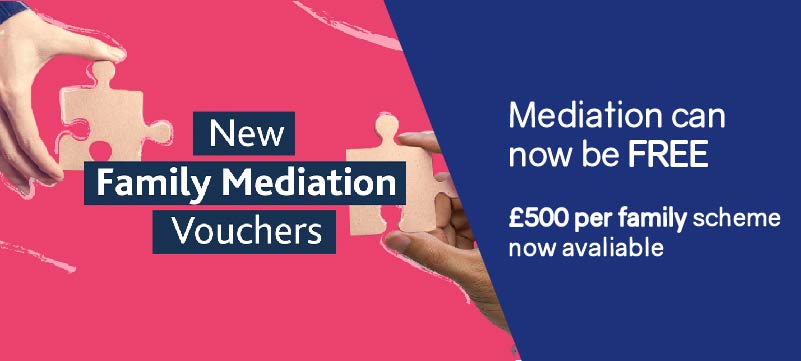Mediation Vouchers: Are you eligible to use them?
Earlier in March, the Government made £1 million available in vouchers for Family Mediation. The vouchers contribute up to £500.00 towards mediation costs per couple, subject to eligibility.
This funding hopes to improve the take-up of family mediation for separating families with children, to help to reduce the Family Court backlog.
So far, there have been a high number of successfully mediated agreements in cases where a voucher was used. There are also sign’s that most who took advantage of the mediation voucher scheme concluded they did not need to take their dispute to court after all.
It seems, therefore, that the enticement of a subsidised service is enough to demonstrate that achieving a non-confrontational settlement is, contrary to much-received wisdom, possible.
What is Family Mediation?
Family mediation is the process where a trained independent mediator helps you work out arrangements with another, (usually your ex-partner) concerning children, finance or property.
The mediator’s job is to help you and another work through disagreements and find solution’s that work for you both. Further, to explain how to make the agreement you reach legally binding, should you want to.
Is Family meditation right for me?
If you would prefer to stay in control of the outcome, Family mediation is the better option. Unlike in court, where a judge makes the decisions about child and financial arrangements, in mediation you and the other party decide what you agree to and what you don’t. Where children are involved, mediation can help to put your child’s interests first.
Mediation is typically less stressful, and results are faster than going to court, so can be an efficient way of resolving disagreements. However, if you don’t reach an agreement, you still have the right to go to court. It’s important to note that you cannot go straight to court without at least considering mediation. You will need to show reasons why mediation is not suitable under your circumstances – these are detailed in the next question.
Additionally, mediation can help when circumstances change, and you need to make new arrangements without delay. For example, as children get older, you can negotiate arrangements for children without having to go to court.
Why might mediation not be right for me?
There are many reasons why mediation may not be right for certain circumstances and families. If you’re looking for legal action, and there is no mediator available or you have received mediation previously, then you may be able to go to court.
Otherwise, you may want to skip mediation if:
- You are a victim of domestic abuse and violence
- There are child protection concerns
For these exceptions, you will need to provide evidence. This will usually be evidence from the police, any previous court involvement, local authority, or other organisations such as domestic violence or abuse support services.
You do not have to receive mediation if:
- You’re applying for a consent order
- Any of the children in the application are involved in emergency proceedings, care proceedings or supervision proceedings
- Any of the children in the application are the subject of an emergency protection order, care order or supervision order
What is the Family Mediation Voucher Scheme?
This is a time-limited scheme, designed to support families who may be able to resolve their family law disputes outside of the Family Court. The Government set up the scheme in response to the backlog of court cases and to encourage more people to consider mediation as a means of resolving their disputes, where appropriate.
This is supported by a financial contribution of £500 towards the costs of mediation if you are eligible. However, you will need to use a Mediator authorised by the Family Mediation Council, who is taking part in the scheme.
Who can use the mediation vouchers?
If mediation is suitable for your circumstances, as outlined above, and/or you’ve been instructed to attend mediation from the Court, you will need to attend what is called a Mediation Information & Assessment Meeting or MIAM.
This is your initial meeting where a qualified mediator will assess whether mediation is right for you and where they will also advise whether you’re eligible for the voucher scheme.
Not all cases are eligible under the scheme. However, these are the types of cases that are eligible for a mediation voucher:
- Disputes over children
- Disputes over family financial matters where you also involved in a dispute relating to a child.
You should remember that mediation is only an option when both parties agree to take part, so you and the other person will need to agree to mediate.
If you have a family dispute, whether that be over children, finances, or property, get in touch with our expert Family Solicitors. You can find out more about our family services here, or you can call us on 023 8023 4433 to get started.
Disclaimer: Information on this webpage is not intended for legal purposes or advice. If you require legal advice or services you should seek a professional legal practitioner.
Get to know us!
We send weekly updates containing news articles and blogs on the latest trends happening in the UK and abroad. If you want to get to know us better, sign up below.
When you sign up for our newsletter and occasional tailored communications you agree to our Privacy Policy.





No comment